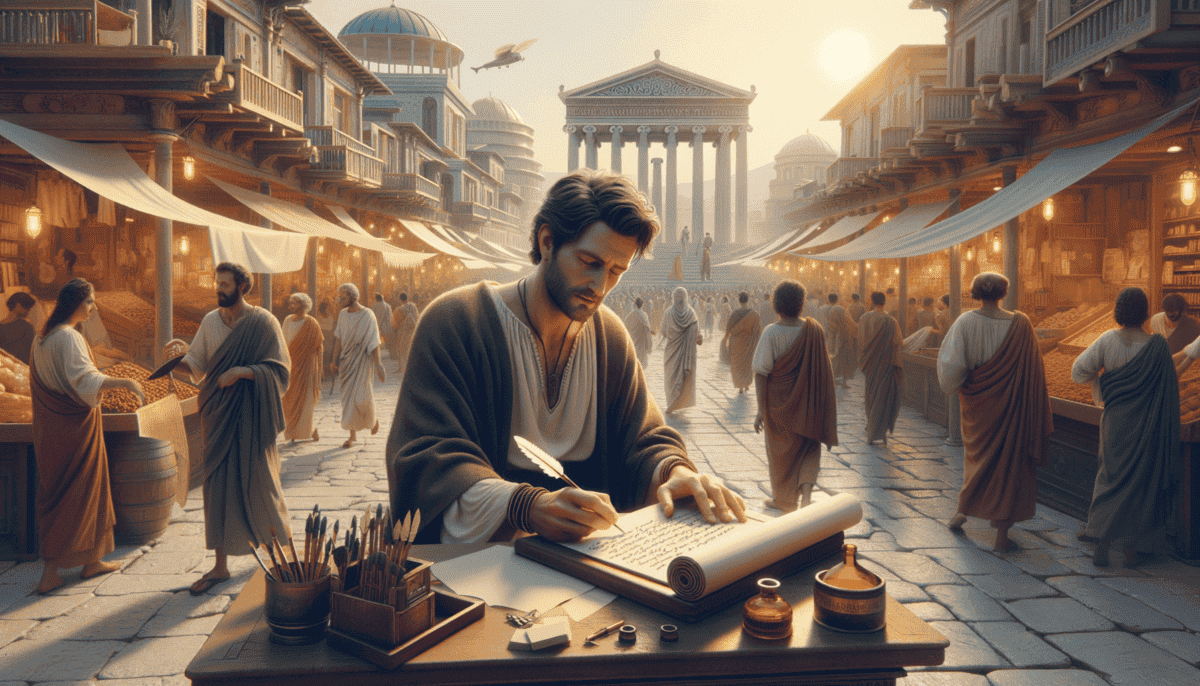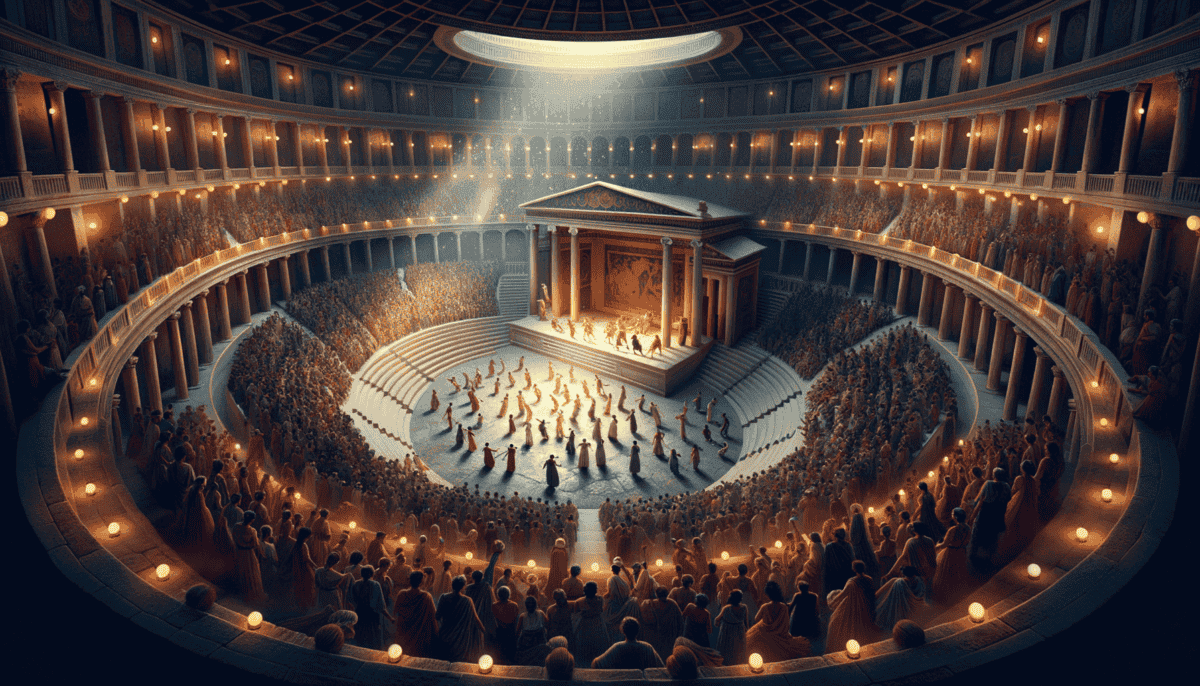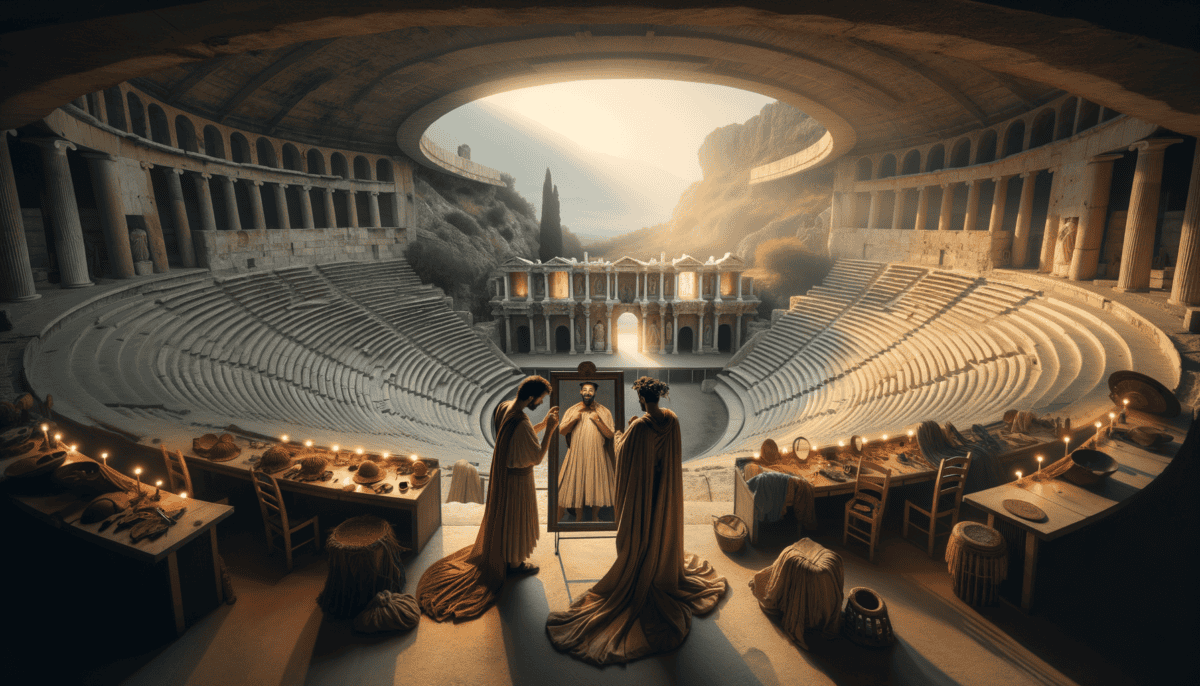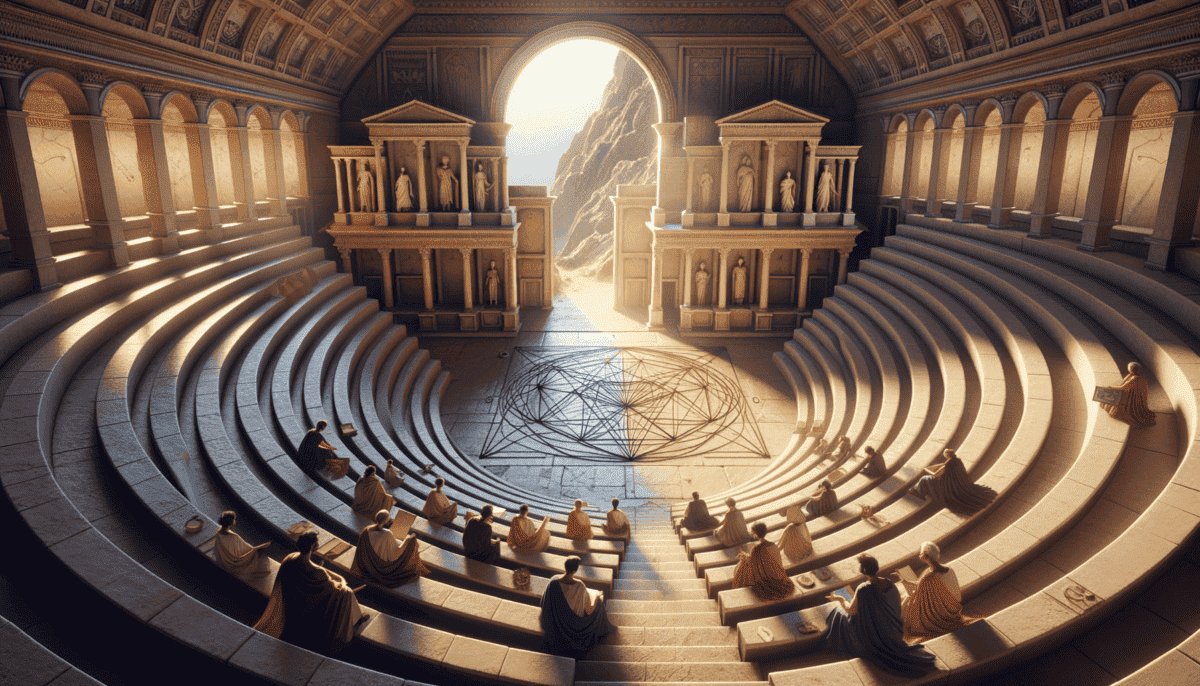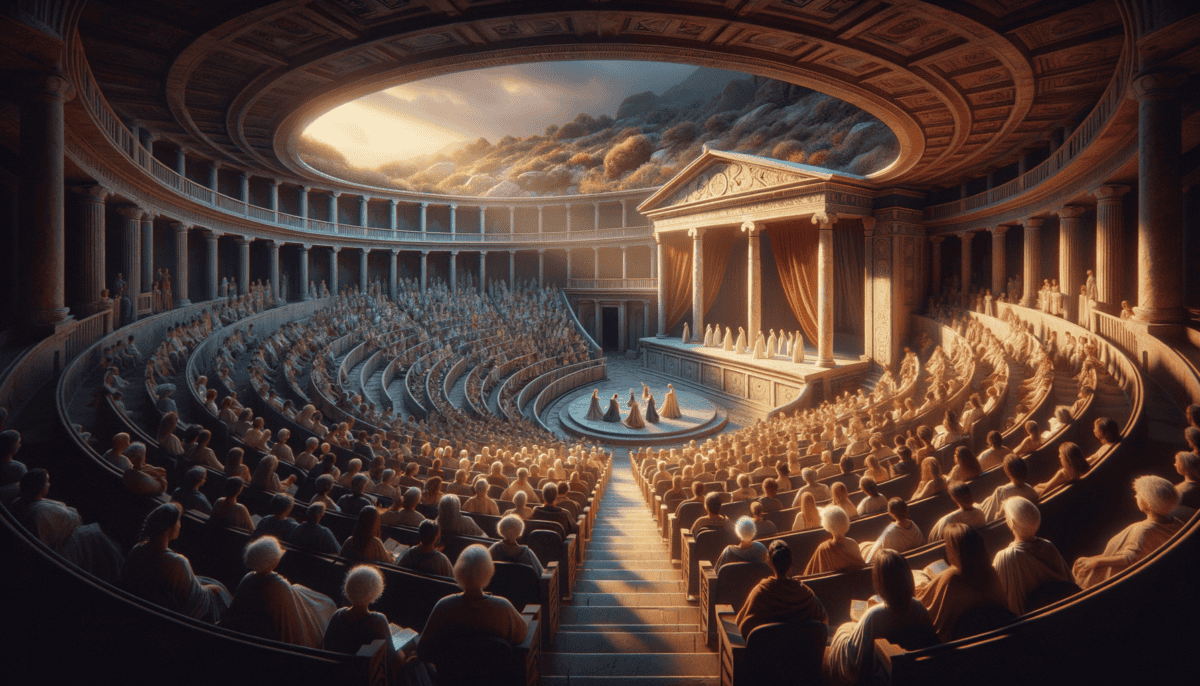The Whispers of Epidaurus
Long ago, in a beautiful land called Greece, there was a special place where magic happened. This place was called Epidaurus, and it held one of the most amazing theaters ever built! ️
"Listen carefully," whispered Sofia, a young girl visiting the ancient theater with her grandfather. "Can you hear how clear every sound is?"
Her grandfather dropped a coin on the stone stage far below. ping! The sound flew up to where they sat, crystal clear, even though they were very far away.
"But Grandpa," Sofia asked, "how did they make sounds travel so well without any speakers?"
Her grandfather smiled and pointed to the seats, arranged in perfect circles going up the hillside. "The Greeks were very clever. They built this theater using special shapes that helped sounds bounce just right."
The theater sat in a valley between green hills, like a giant bowl carved into the earth. The warm sun made the limestone seats glow golden. Birds chirped overhead, their songs carrying clearly across the ancient space.
A Special Design
"Watch this," said Grandpa. He walked to the center of the stage – what the Greeks called the orchestra – and spoke in a normal voice. "Welcome to the theater!"
Sofia giggled with amazement. Even from the very top row, she could hear him perfectly!
"The Greeks knew that sound travels in waves," Grandpa explained. "They made the seats curve just right so the sound waves would bounce to every person watching the show."
• Perfect curved seating rows
• Special stone that reflects sound
• Stage design that projects voices
• Natural hillside setting
Sofia closed her eyes and imagined what it was like thousands of years ago. She could almost see the actors in their colorful masks, hear the chorus singing, and feel the excitement of the huge crowd watching stories come to life.
"People came from all over Greece to see plays here," said Grandpa. "They watched stories about heroes, gods, and regular people facing big challenges."
The wind rustled through the ancient stones, carrying whispers of all the performances that had happened there. Sofia felt like she could hear them too – the laughter, the gasps, the applause of audiences from long ago.
"Can we act out a scene?" Sofia asked excitedly. She ran down to the stage, her footsteps echoing clearly.
"Of course!" Grandpa joined her. "That's what this place was built for – sharing stories that touch people's hearts."
Together they performed a simple scene, their voices carrying perfectly to the empty seats. The theater seemed to come alive around them, just as it had done for thousands of years.
As the sun began to set, painting the ancient stones in orange and pink, Sofia didn't want to leave. This magical place had shown her how smart the ancient Greeks were, and how they found amazing ways to share their stories with everyone.
"Will you tell me more about the plays they performed here?" Sofia asked as they walked out.
"Tomorrow," Grandpa promised. "There are so many wonderful stories to share about the playwrights who wrote for this stage."
The theater of Epidaurus stood silent in the evening light, waiting for its next performance, just as it had done for over two thousand years.
The Voices of Inspiration
The next morning, Sofia couldn’t wait to learn more about the people who wrote plays for the ancient theaters.
“Who wrote all those amazing stories?” she asked her grandfather as they sat in their sunny garden.
“One of the most famous playwrights was named Sophocles,” Grandpa explained. “He wrote stories that made people think and feel deeply.”
He wrote over 120 plays and won many contests. That’s like writing a new story every few months for years and years!
“What kind of stories did he write?” Sofia asked, leaning forward eagerly.
“Well, let me tell you about one of his most famous plays,” Grandpa said. “It’s about a brave princess named Antigone who had to choose between following her heart and following the rules.”
Sofia’s eyes grew wide. “Just like when I had to decide whether to tell the truth about breaking Mom’s favorite vase!”
Grandpa chuckled. “Exactly! The Greeks wrote about big feelings that everyone can understand – love, courage, doing what’s right.”
A City of Stories
In ancient Athens, plays were very important. People would gather in huge crowds to watch them, just like we go to movies today!
“The best part,” Grandpa continued, “was that regular people could help choose which plays they liked best. They had contests where different writers would share their stories.”
• Plays helped people learn about right and wrong
• Stories often had songs and dance
• Writers competed to win prizes
• Everyone in the city could watch
“Could girls write plays too?” Sofia wondered.
“In those days, mostly men wrote the plays,” Grandpa explained. “But the stories were about everyone – mothers, daughters, kings, and ordinary people too.”
Sofia grabbed her notebook and started writing. “I’m going to write a play about our visit to Epidaurus!”
“That’s wonderful!” Grandpa smiled. “The Greeks believed that sharing stories helps us understand each other better.”
Stories That Changed the World
As Sofia wrote, Grandpa told her about other famous playwrights:
“There was Aeschylus, who wrote exciting stories about heroes and gods. And Euripides, who liked to surprise people by telling familiar stories in new ways.”
“Like when we tell the Three Little Pigs from the wolf’s side?” Sofia asked.
“Just like that! These writers helped people think about things in different ways. Their plays asked big questions like ‘What makes someone brave?’ or ‘How do we know what’s right?'”
Sofia looked up from her notebook. “My story asks ‘How did the Greeks make such amazing theaters?'”
“That’s a perfect question!” Grandpa beamed. “And tomorrow, we can learn about the special festivals where they performed these plays.”
As the afternoon sun warmed their garden, Sofia kept writing her play, feeling connected to those ancient storytellers who shared their ideas in the beautiful theater of Epidaurus.
“Maybe someday someone will perform my play in a big theater,” Sofia said dreamily.
“They just might,” Grandpa smiled. “After all, great stories have a way of finding their audience, just like they did thousands of years ago.”
The Grand Festival
The sun rose over Athens, painting the sky in beautiful colors. Sofia bounced out of bed, excited for another day of learning about ancient theaters.
“Today we’re going to talk about the biggest party in ancient Greece!” Grandpa announced at breakfast.
“A party? With cake?” Sofia asked hopefully.
Grandpa laughed. “Even better! It was called the Festival of Dionysia. People came from all over to watch plays for five whole days!”
The City Dionysia was like having a huge fair, theater show, and celebration all at once. Imagine your whole town having a party that lasted almost a week!
Getting Ready for the Show
“Before the festival started,” Grandpa explained, “the whole city would get ready. People cleaned the streets and decorated everything with flowers.”
“What happened first?” Sofia asked, munching her toast.
“They had a big parade! People carried special statues through the streets. Musicians played flutes and drums. Everyone sang songs to welcome the festival.”
Sofia’s eyes lit up. “Like a birthday parade?”
“Even bigger! And after the parade, the plays would begin.”
• Wake up at sunrise
• Walk to the theater
• Watch three plays
• Have snacks and talk about the stories
• Vote for your favorite play
Everyone Gets to Watch
“The best part was that everyone could see the plays,” Grandpa continued. “Rich people, poor people, even visitors from other cities.”
“Did they have to buy tickets?” Sofia wondered.
“The city actually helped poor people pay for tickets! They thought everyone should get to see the plays.”
“That’s so nice!” Sofia clapped. “Did they have popcorn like at the movies?”
“They had different snacks – dried fruit, nuts, and sweet treats. People would spend all day at the theater, watching stories come to life.”
The Big Competition
“At the end of the festival,” Grandpa said, “everyone got to vote for their favorite plays.”
“How did they vote?” Sofia asked.
“They picked judges from the crowd. These judges would think carefully about each play and pick the winners.”
“Like on those TV singing shows?”
“Sort of! The winning playwright got a special prize and lots of honor. It was a big deal to win at the festival.”
Sofia grabbed her notebook. “I’m going to draw a picture of the festival parade!”
Coming Together
“The festivals were special because they brought everyone together,” Grandpa explained. “People would laugh, cry, and think about big ideas – all while sitting next to their neighbors.”
“Like when we watch movies with our friends?” Sofia asked.
“Exactly! But imagine doing it with your whole city. The plays helped people understand each other better.”
Sofia drew colorful flags and happy people in her parade picture. “I wish we could go to a festival like that.”
“We still have theaters today,” Grandpa smiled. “And people still come together to share stories, just like they did back then.”
“Can we go see a play soon?” Sofia asked hopefully.
“Of course! And tomorrow, I’ll tell you about something very special – the masks that actors wore to become different characters.”
Sofia added masks to her drawing, imagining the exciting festivals where stories brought an entire city together.
Magic Behind the Mask
Sofia woke up early, her mind full of dreams about ancient Greek theaters. Today was extra special – Grandpa had promised to show her something magical!
“Look what I found in the attic,” Grandpa said, holding up a dusty box.
Sofia’s eyes grew wide as Grandpa pulled out a beautiful mask. It was painted white with rosy cheeks and a big smile.
Greek actors used masks to play different characters. One actor could be a king, a hero, or even a goddess – all in the same play!
Dress Up Time
“Can I try it on?” Sofia asked excitedly.
“Of course! In ancient Greece, actors wore masks just like this one.” Grandpa helped Sofia put on the mask.
“My voice sounds different!” Sofia giggled.
“That’s part of the magic! The masks had special mouth shapes that made voices louder and clearer.”
The Actor’s Costume Party
“What else did actors wear?” Sofia asked, twirling in front of the mirror.
“They wore long, colorful robes called costumes. And special shoes too!” Grandpa pulled out a picture book.
“Those shoes look tall!” Sofia pointed at the picture.
“They’re called cothurni – like high heels but for actors. They made them look taller on stage!”
• Masks for different characters
• Long, flowing costumes
• Special tall shoes
• Strong, clear voice
• Big movements
Learning to Act
“Being an actor was hard work,” Grandpa explained. “They had to learn many things.”
“Like what?” Sofia asked, still wearing the mask.
“They learned to move in big ways so everyone could see them. They practiced speaking loudly and clearly. And they had to remember lots of words!”
“That does sound hard,” Sofia agreed.
The Power of Pretend
“Watch this,” Grandpa said. He put on another mask – this one looked sad.
“When I wear this mask, how do I make you feel?” he asked softly.
“A little sad,” Sofia admitted. “Even though I know it’s you!”
“That’s the magic of theater! The masks helped people feel different emotions.” ❤️
Stories Come Alive
“The best actors could make any story feel real,” Grandpa continued. “They used their whole body to tell stories.”
Sofia stood up straight and moved her arms wide. “Like this?”
“Perfect! Now you’re acting just like an ancient Greek performer!”
Sofia paraded around the room, trying different voices. “I feel like I could be anyone!”
“That’s why theater is so special,” Grandpa smiled. “It lets us step into someone else’s shoes and see the world differently.”
Practice Makes Perfect
“Did actors practice a lot?” Sofia asked, carefully taking off her mask.
“Every day! They worked with teachers called choregus who helped them get better.”
“Like my dance teacher!”
“Exactly! They learned to sing, move, and speak beautifully. It was like going to a special school.”
Sofia picked up another mask from the box. This one looked fierce and brave. “Tomorrow can we practice being different characters?”
“Of course! And I’ll tell you about something even more amazing – how they built theaters that carried voices all the way to the back row!”
Sound Science and Stone Steps
Sofia bounced excitedly as Grandpa led her into his study. On his desk sat a strange model made of blocks and circles. ️
“What’s that?” she asked, pointing at the model.
“This is how the Greeks built their theaters,” Grandpa smiled. “Want to see something cool?”
The Perfect Shape
Grandpa held up a small round mirror. “The Greeks knew something special about circles. Sound travels in them like magic!”
He tapped the model’s center. A tiny bell sound rang clear and sweet.
The Greeks used circles and math to make perfect sound. They built seats in a big half-circle shape called a “theater bowl.”
“Look how the seats go up like stairs,” Sofia noticed.
“That’s right! Each row sits a little higher than the one in front. Everyone could see and hear perfectly!”
Stone Secrets
Grandpa pulled out a box of different rocks. “Feel these,” he said.
Sofia touched each stone. Some felt smooth, others rough.
“The Greeks picked special stones that helped bounce sound better,” Grandpa explained. “Like tiny mirrors for noise!”
Testing the Sound
“Can we try it?” Sofia asked.
Grandpa nodded and pulled out two paper cups with string between them. “This shows how sound moves.”
Sofia spoke into one cup while Grandpa held the other to his ear.
“I can hear you so clearly!” he laughed. “The Greeks used the same idea, but with stone instead of cups!”
• Round theater shape
• Special stone seats
• Steps going up high
• Perfect angles
• Smart building plans
Nature’s Help
“Did you know the wind helped too?” Grandpa asked.
Sofia shook her head.
“They built theaters on hillsides where the wind pushed sound up to the back rows!”
“That’s so smart!” Sofia clapped. ️
Building Blocks
Grandpa helped Sofia stack blocks to make a tiny theater.
“Each stone had to fit just right,” he explained. “Like a giant puzzle!”
“Was it hard to build?”
“Very! But the Greeks were excellent builders. They measured everything carefully.”
The Echo Game
“Let’s play a game,” Grandpa suggested. He set up cups at different angles.
“Whisper into each cup. See which way makes the loudest echo.”
Sofia tried different positions. “This one’s best!” she said, finding the perfect spot.
“That’s exactly what the Greeks did! They tested until they found the perfect place for every seat.”
Modern Mystery
“Even today, scientists study these old theaters,” Grandpa said. “They still work perfectly after thousands of years!”
Sofia looked amazed. “Can we visit one someday?”
“We can! And when we do, I’ll show you how you can hear a whisper from way up in the back row.”
“Promise?” Sofia asked hopefully.
“Promise! And wait until you hear about all the famous plays people still perform in these theaters today!”
Timeless Tales and Modern Stages
The morning sun streamed through Sofia’s window as she packed her small suitcase. Today was the day!
“Ready for our big adventure?” Grandpa called from downstairs.
“Coming!” Sofia rushed down, clutching her notebook full of theater drawings.
Journey to Greece
The airplane soared over sparkling blue waters. Sofia pressed her face against the window.
“Look! That’s Greece down there,” Grandpa pointed. “Where all our theater stories began.”
“Will we see a real play?” Sofia bounced in her seat.
People still put on plays in the same theaters the ancient Greeks built thousands of years ago!
Walking Through History
At the theater of Epidaurus, Sofia’s eyes grew wide. The stone seats stretched up toward the sky.
“It’s so much bigger than our model!” she gasped.
“Watch this,” Grandpa smiled. He walked to the center stage and dropped a coin. The tiny *ping* echoed clearly all the way to where Sofia sat at the top.
Modern Magic
As the sun set, more people filled the seats. Lights came on, turning the ancient stones golden.
“Look how they use new lights with the old theater,” Sofia noticed.
“That’s right! We keep the best parts of the past and add new ideas too.”
• Special lights
• Sound systems
• Comfy seat cushions
• Night shows
• New kinds of plays
Stories Live Forever
The play began as darkness fell. Actors in bright costumes moved across the stage.
“This is the same play they showed here 2,000 years ago!” Grandpa whispered.
“Really?” Sofia watched, amazed. “The same words?”
“The very same! Good stories last forever.”
Sharing the Magic
After the show, Sofia met other kids from different countries.
“We all understood the story, even though we speak different languages,” she told Grandpa.
“That’s the real magic of theater – it brings people together, just like it did long ago.”
Looking Forward
On their last day, Sofia sat drawing in her notebook.
“What are you designing?” Grandpa asked.
“My own theater!” she grinned. “But with some new ideas too!”
Grandpa smiled proudly. “That’s perfect. The Greeks would have loved that – keeping their ideas alive while making new ones too.”
As they headed home, Sofia hugged her notebook close. The ancient theaters had taught her something amazing – good ideas never get old, they just keep getting better! ⭐
Back in her room, Sofia pinned her theater drawings on her wall. She couldn’t wait to share what she’d learned with her friends. Maybe someday she’d help build theaters too, mixing old wisdom with new dreams – just like the Greeks would have wanted.


